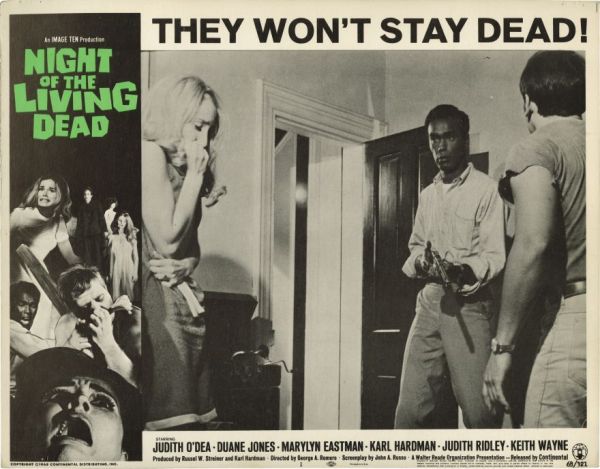Ever since director George A. Romero released his 1968 shocker Night of the Living Dead—which reimagined zombies, the dark magic-entranced slaves of voodoo folklore, as shambling fiends that crave warm flesh and can only be offed with a head shot—the zombie genre has displaced the western as cinema’s most popular and durable morality play. As the video essay “Zombie 101” demonstrates, while the genre’s superficial appeal is the spectacle of torn and mangled flesh—living and dead—its deeper resonance lies in its portrait of ordinary people struggling to survive in extreme circumstances.
Ultimately zombie films aren’t about the zombies, which have no conscious mind and therefore no personality. They’re a collective menace—rotting emblems of plague, catastrophe, war, and other world-upending events. The films depict representative social types wandering amid the ruins of the civilization they once took for granted, trying to reconcile their pre-zombie moral code (do unto others as you would have them do unto you) with the harsh necessities of the present (“If you’ve got a gun, shoot ’em in the head,” a sheriff tells a TV reporter in Night of the Living Dead, adding, “If you don’t, get yourself a club or a torch. Beat ’em or burn ’em, they go down pretty easy”).If there’s no military, no police force, no law, no justice, and no hope, what’s the point of being decent as opposed to selfish? Might it be possible that, under such unimaginably awful circumstances, selfishness is decency? And if your mom is bitten by a zombie, at what point is it all right to stop treating her like your mom and reach for the 12-gauge? Dear Abby never had to ponder such questions. To quote the alternative title of a 1974 Werner Herzog movie, in zombie films it’s every man for himself and God against all. And as survivors sift through the rubble, weighing selfish imperatives against kinder, gentler impulses that might get them and everyone around them killed, the genre pulls off a nifty bit of creative jujitsu, defining civilization, morality, stability, and decency by depicting their opposites. - Matt Zoller Seitz
The film that established the cinematic zombie as we still know it, George Romero‘s debut remains so rich in socio-political allegory, so fascinating in its discussions around race, gender and the fundamental impossibility of peaceful human coexistence, and so central in shaping the landscape of contemporary horror cinema, that one particular aspect of the film is often overlooked – just how damn beautiful it is. Shot on gorgeously grainy black and white, it blends vérité-like realism with bold cuts and exaggerated angles, crafting a monochromatic marvel that feels simultaneously retro and forward thinking. No matter which of Romero’s Dead films tops your own personal list, there’s no denying that the days to follow never looked as good as the night before. – Michael Blyth
Talking to Hillary Weston in 2019, Jim Jarmusch noted that “there’s a suspension of rationalism in Night of the Living Dead. The zombies are drifting away from any kind of identity or meaning. They’re not monsters that come from outside the social structure, like Godzilla or Frankenstein; they are the remnants of that broken social structure. They come from within; they are us.”
Night of the Living Dead (USA: George Romero, 1968: 96 mins)
Azevedo, Rafael Alves. "Fighting Two Wars: George A. Romero’s Night of the Living Dead as a Critique of 1960s American Society." Sequart (April 15, 2015)
Anderson, Jeffrey. "Night of the Living Dead (Again): A Halloween appreciation." Keyframe (October 27, 2015)
Bradley, S.A. "My Ride's Here: Remembering George A. Romero." Hellbent for Horror #48 (July 27, 2017)
Ebert, Roger. "Night of the Living Dead Chicago Sun-Times (January 5, 1969)
Eggert, Brian. "Night of the Living Dead (1968)," Deep Focus (October 27, 2008)
Harper, Stephen. "Night of the Living Dead: Reappraising an Undead Classic." Bright Lights Film Journal (November 1, 2015)
Kane, Joe. "How Casting a Black Actor Changed Night of the Living Dead." The Wrap (August 31, 2010)
Salvatore, Greg. "Night of the Living Dead: Horror Movie as Social Commentary." Dreams of Literary Grandeur (October 30, 2011)
Seitz, MattZoller. "Zombie 101." Moving Image Source (October 28, 2009)
Subissati, Andrea and Alexandra West. "Undead Walking: Night of the Living Dead (1968), Dawn of the Dead (1978) and Day of the Dead (1985)." Faculty of Horror #54 (October 31, 2017)

No comments:
Post a Comment